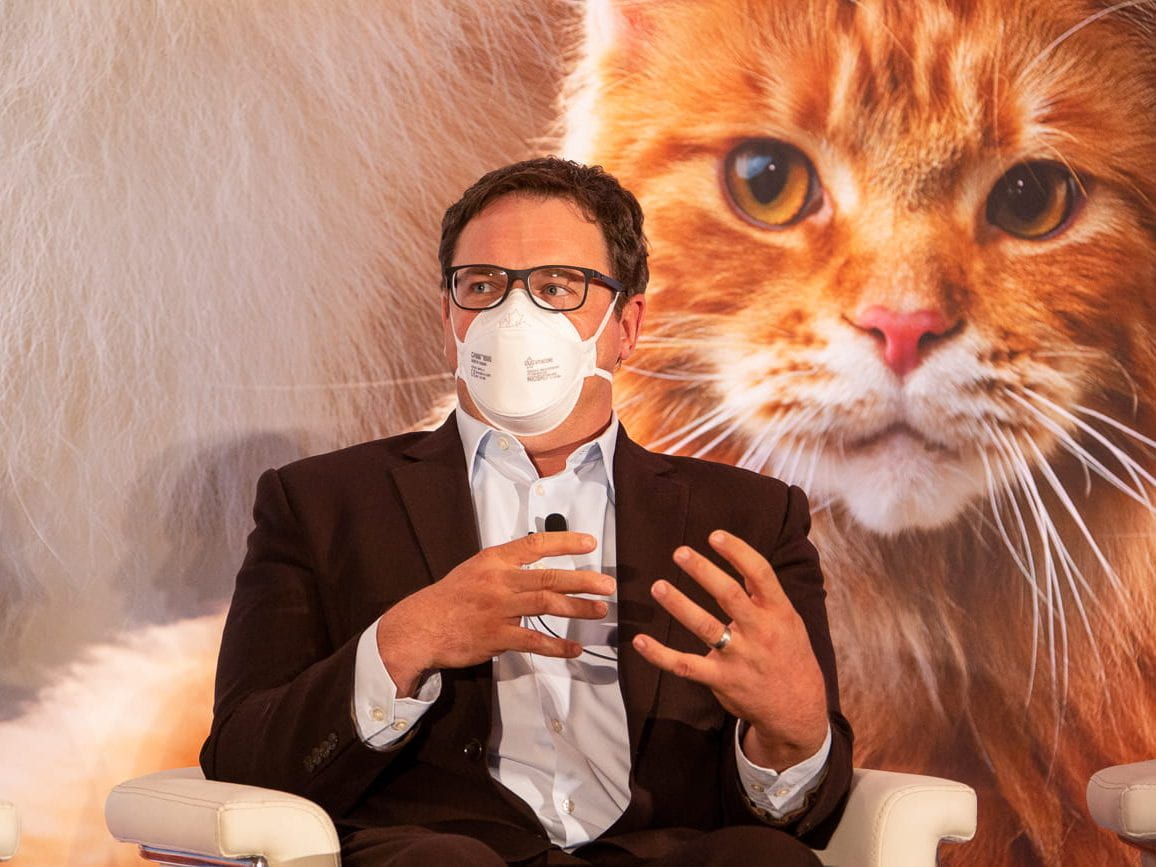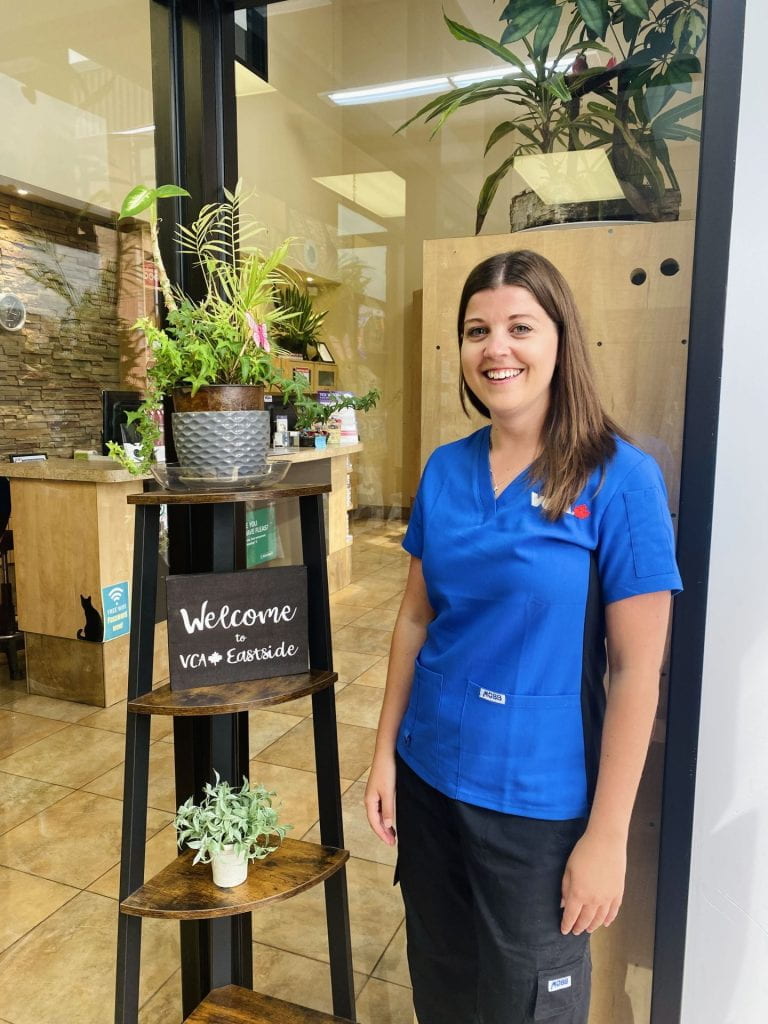The VCA Canada Chair in Relationship-Centred Veterinary Medicine is held by Dr. Jason Coe, DVM, PhD.

VCA Canada Chair in Relationship-Centred Veterinary Medicine
The new $1,000,000 chair is a gift from VCA Canada, and is believed to be the first of its kind worldwide. The goal of the chair is to improve the lives of pets, veterinary clients, and veterinary teams by strengthening veterinary communication and relationship-building through research and teaching.
Dr. Coe was a natural choice for the position, with his background as a leading expert in veterinary clinical communication at the University of Guelph’s Ontario Veterinary College (OVC), and a Professor in the University’s Department of Population Medicine. “I am grateful for the opportunity to serve as the VCA Canada Chair in Relationship-Centred Veterinary Medicine,” said Coe, a 2001 DVM grad who joined the OVC faculty in 2008 after completing a PhD in veterinary clinical communication.
“The foundation of the veterinary profession is relationships — between the client and the animal, between the client and members of the veterinary team, and between veterinary team members. Communication and relationships cross everything we do.” ~ Dr. Jason Coe

RCVM@OVC team members at a VCA Canada conference:
Dr. Kat Sutherland, Dr. Natasha Janke, and Catherine Groves
The VCA Canada Chair has enabled the development of a research program dedicated to relationship-centred veterinary medicine
This chair and the support from VCA Canada have enabled Dr. Coe to build a research team and develop a research program called Relationship-Centred Veterinary Medicine at the Ontario Veterinary College — RCVM@OVC — dedicated to bolstering the relationships comprising the circle of care in veterinary medicine. The program is founded on 6 avenues of relationship-centred research, described on the Research Avenues pages of this website.
In addition to enhancing the lives of pets and their owners through the chair position, the RCVM@OVC program is developing novel practice models for more sustainable business operations and enhanced mental health and well-being for veterinary teams. Research has shown that these teams suffer higher levels of stress, burnout, depression, anxiety, and suicidal ideation compared to members of the general public.
“With this chair and this remarkable leadership gift from VCA Canada, we have an opportunity to make a real difference for veterinary teams and the clients and pets they serve, by providing evidence-based solutions to their most urgent challenges.” ~ Dr. Jeffrey Wichtel, OVC Dean
Dr. Wichtel stresses that the gift comes at a “critical inflection point” in veterinary medicine, with growing urbanization, changing veterinarian and consumer demographics, standards of care and public perceptions of the veterinary profession. VCA Canada, as a future employer for some OVC graduates, shares OVC’s vision of a more sustainable veterinary profession.
VCA Canada shares OVC’s vision
VCA Canada, based in Calgary, Alberta, runs upwards of 150 veterinary hospitals across Canada. The organization is part of Mars Veterinary Health, a global division of Mars Petcare.
“Creating a healthy and vibrant professional landscape will ensure a better world for pets, their families, and veterinary care providers,” said VCA Canada’s Dr. Craig Mosley, who is also a graduate of OVC. “We’re excited to collaborate with OVC as we work together to shape the future of our profession.”
The study of relationship-building during the pandemic and beyond is a key focus facilitated by the chair

Dr. Coe emphasizes that the importance of communication and relationships has become even more apparent during the COVID-19 pandemic. “Veterinary teams face front-line challenges including added stress and increased potential for burnout,” says Coe.
Besides looking at how veterinary communication has changed during the pandemic, the 5-year chair program is examining ways to support long-term relationship-building among clients and veterinary team members, and how to incorporate new research in the field into practice and teaching.
“The pandemic has dramatically changed the way veterinarians and clients are interacting and communicating,” Coe says. To keep people safe while ensuring high-quality patient care, clinicians often still see companion animals for examinations, but client communication may occur online or by phone. These safety measures can add anxiety and uncertainty for both practitioners and clients.
“You lose a lot of non-verbal communication you relied upon previously to engage with and read clients. As a result, practitioners need to be more intentional about verbal communication.” Coe says the chair is enabling his RCVM@OVC team to study those interactions and identify opportunities to support patient care and veterinary education during and beyond the pandemic. “We can learn best practices for virtual care and share those with the veterinary profession,” he said.
This chair supports research on how team relationships can enhance other job-related variables within veterinary teams
Coe and his team are also studying ways to strengthen and support relationships among veterinary team members to enhance job satisfaction and commitment, and reduce stress among practice teams.
“The Ontario Veterinary College is one of the leading research centres in clinical veterinary communication in North American and internationally,” said Coe. The chair enables the OVC to build on that reputation to further support the veterinary profession.

A broad scope of impact is expected to stem from the VCA Canada Chair
Coe also intends to incorporate research from the chair into student education at OVC and share results with other veterinary colleges in Canada and abroad.
The RCVM@OVC team is grateful for the generosity of VCA Canada in establishing this chair, and for recognizing that change based on clear, supportive evidence minimizes risk and maximizes the return for the entire veterinary industry.
A
Interested in learning more about the VCA Canada Chair in Relationship-Centred Veterinary Medicine?
Read the news release about the VCA Canada Chair in Relationship-Centred Veterinary Medicine.
“We’re excited to collaborate with the OVC as we work together to shape the future of our profession.”
Dr. Craig Mosley, DVM, VCA Canada



